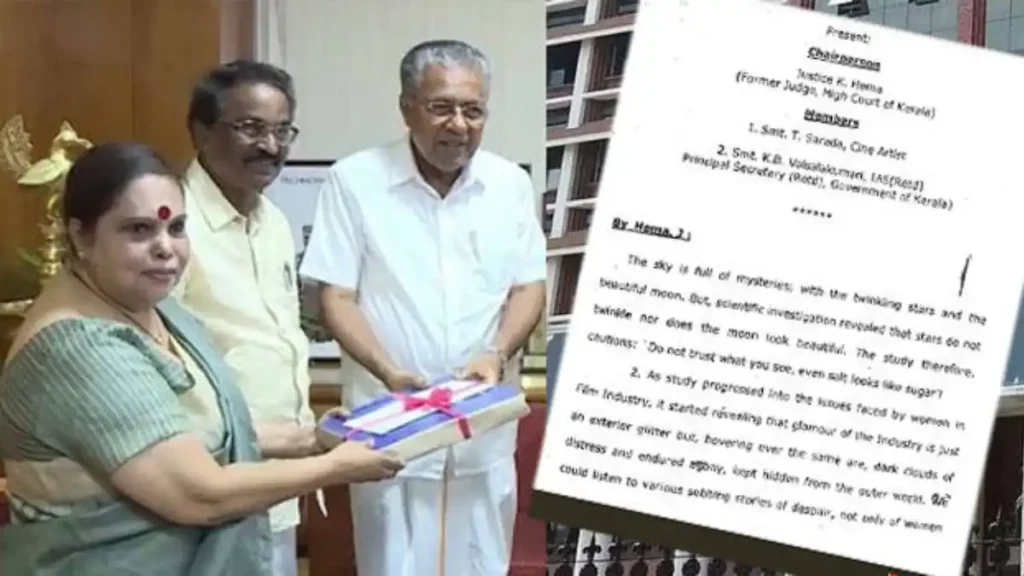Justice Hema Committee report on women’s difficulties also mentions discrimination, illegal bans, drug and alcohol addiction, unequal pay, and inhuman working conditions in the sector.

Five years after it was submitted to the Kerala government, the K. Hema commission report on the issues women encounter in the Malayalam film industry was made public on Monday. It told horrifying stories of drug and alcohol abuse, wage inequality, discrimination, sexual exploitation, and, in some cases, inhumane working conditions.
What is The Hema Committee report?
Actors who are well-known claim that a group of male producers, directors, and actors control the Malayalam cinema industry and have the power to bar anyone from entering the field. The 235-page report, which was made public after the names of the accused and witnesses were withheld, makes this assertion.

The Hema committee substantiates the industry rumors regarding the “casting couch” procedure. In contrast to other industries, sexual harassment in the film business begins even before a woman begins working there since prominent figures in the sector ask for sexual favors in exchange for role offers.
A few witnesses presented screenshots of WhatsApp communications, audio clips, and video clips as evidence of attempts to cast couch. Since drunken males frequently knock on the doors of the accommodations provided for them during the filming, many of the women feel unsafe leaving the house alone.

According to the study, witnesses also related stories of attempts to break into their rooms. In one particular instance, the victim suffered greatly as a result of having to play her abuser’s wife the very day after the incident. Certain individuals within the industry deliberately fabricate the narrative that successful women have achieved their success by making “compromises” to influence novices.
Well-founded fears
Numerous individuals scrutinized by the committee were reluctant to divulge personal details out of concern for unfavorable outcomes. The apprehension is justified. The committee makes the scathing observation that it worries about both their safety and the safety of their close relatives.

Many women in the film industry have experienced such horrific things that they haven’t even told their close relatives about them. Because of their public profiles, they also avoid approaching the police for fear of repercussions from influential figures in the sector and cyberattacks.
Producers are cautioned by the industry’s “power group” not to cast performers who start to lose their appeal. Since the Film Chamber of Commerce must grant an NOC, even the release of motion pictures may be suspended. Production controllers have a big responsibility to play in keeping people out of movies.

It was against the law for members of the Women in Cinema Collective (WCC), whose demands helped to establish the Hema Committee, to go to the cinema because their organization brought attention to the injustices that women had to face.
The study draws attention to the dearth of restrooms and changing areas on the set, particularly in outdoor settings, which causes urinary tract infections in a large number of women. The Hema commission report adds that among those who spoke before it was a well-known actor who said the issue did not require serious consideration.

Junior painters are “treated worse than slaves” and occasionally compelled to work up to 19 hours a day. Recurring payments account for a significant amount of the money that middlemen unintentionally get. Following a serious burn injury on the set of a high-end movie, a 70-year-old woman received no financial assistance for her medical care. Any film outfit will not be accepted The younger performers.
Lack of written contract
Some use the lack of a formal contract as an excuse to refuse the technicians and performers even the agreed-upon verbal compensation. One example given is of an actress who played a major role in a movie and had to execute a private sequence.

When she was urged for more intimate photos, She refused to accept payment for the working days spent on the sets. However, the filmmaker insisted that he would not cut out the already-filmed intimate parts unless she visited Kochi.
There is no minimum compensation for junior artists. Meagre compensation is given to assistant and associate directors for months of nonstop work. They also don’t receive the daily batta. The demanding pre-production job is not considered “work,” and their work is not well defined.

The Report of Justice Hema committee describes that strong individuals may intimidate or pressure WCC members to handle complaints in a way that suits them, rendering an internal complaints committee ineffectual. The committee suggests that to handle every problem that women in film encounter, the government should create a tribunal and pass a suitable statute.
Read more: Meet IPS Officer Nalin Prabhat – The New DGP of Jammu and Kashmir!











